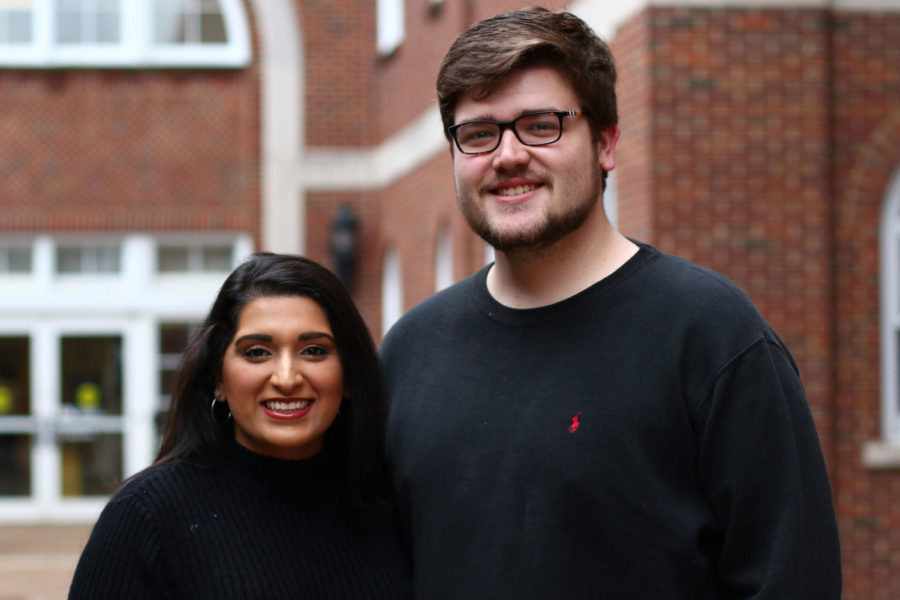Hamilton and Ali want a campus where every student voice matters
Vice presidential candidate Noor Ali and presidential candidate Michael Hamilton pose behind the Grehan Journalism Building on Friday, Feb. 16. Photo by Rick Childress
February 19, 2018
They’re two UK students from eastern Kentucky who are looking to make campus a better place for every student.
“You really can’t tell that I’m from eastern Kentucky with my accent, but sometimes it comes out—usually when I really want to talk about something,” said Noor Ali, a current student senator and vice-presidential candidate from outside Pikeville.
Michael Hamilton, the current senate president and presidential candidate, described their campaign platform as “lofty.”
“Our mantra is simple, it’s ‘You belong here,’” Hamilton said. “We want everyone to know no matter what race, gender, ethnicity, socio-economic status, orientation, that you are a wildcat and your voice matters.”
Hamilton and Ali’s platform is a sprawling list of ideas and changes that they say will have an immediate impact on all students. The platform is built around the provost’s four pillars for student success.
To increase academic success, the pair hope to improve academic advising and academic resources available to students.
Ali said they want to give students the opportunity to help their advisors by having older students serve as “peer-mentors” for upcoming students in the same major or program.
“Advising for advisors is only about 20 percent of their job,” Ali said. “Because they do so many other things. It would be nice to have a student who could say, ‘Yeah, I have this major and these are the classes that I took.’”
Hamilton said they hope to continue to support an ongoing initiative to create a syllabus bank, which would essentially be a database filled with syllabi that students could look through before signing up for classes.
“How many of us have registered for two or more classes just to wait for syllabus week to see if we actually want to keep it?” Hamilton said. “It would be way better for us in the long-term planning to get out in four years if we can make that decision before syllabus week, before we even register to see if we’re going to keep the class.”
Hamilton added that other institutions and some of UK’s benchmark institutions have syllabus banks.
“So it’s like if they can do it, UK can do it,” he said.
They also proposed publishing teacher evaluations so that students can see accurate reviews of a professor along with their syllabus.
“Instead of having to cross your fingers hoping that your professor is on RateMyProfessor online when you go to register for a class, there will be a review tab and you can click and see what your peers think of that professor,” Hamilton said.
To improve student wellness, the pair said they would better promote on-campus mental health facilities and would seek to remove the stigma that is associated with seeking mental treatment.
They hope to establish student-ambassador programs and promotional materials headed up by students who have sought treatment.
“To remove the stigma against receiving treatment for mental health should be a top priority of the administration here,” Hamilton said.
To increase student belonging, Ali and Hamilton said they want to help in UK’s ongoing revamp of the freshman experience.
Students don’t just come to college to learn, but to experience more, Ali said. Focusing more on the experience in classes like UK 101 can help increase retention.
Hamilton said UK 101 should embrace “everything it means to be a Wildcat.” So classes should encourage trips to popular spots around Lexington— like Keeneland– and assignments should force students to go use on-campus services—like the counseling center.
The pair said they also want to establish a meal swipe bank for food-insecure students.
“One of the main concerns we’ve heard from students… is the prevalence of food insecure students on campus, and even homeless students on campus,” said Hamilton, who is on the Dining Advisory Committee.
A meal swipe bank would save some unused meal swipes and make them available for students who show a “direct need” and that they’re food insecure.
“You have enough to worry about as a student,” Hamilton said. “You should not have to worry about where your next meal is coming from.”
Hamilton said there are also on-going changes within the scholarship system, and because of reduced state funding he wants to try and establish more scholarships that are backed with outside funding.
Scholarships which utilize outside funding will also foster relationships between the community and the university, Ali said. Engaging UK and Lexington together more is going to make the two come together as a whole.
“Both areas are so important to the vitality of Kentucky,” Ali said.
If they aren’t elected, Hamilton and Ali said they would stay involved with SGA, and would love to pass along their three pages of notes about campus issues to whoever wins.
Hamilton and Ali are facing Riley Grant and Tucker Lovett, and Ross Boggess and Sydney Otten.
Elections will be held on Feb. 21 and 22 at http://uksga.org.




















































































































































